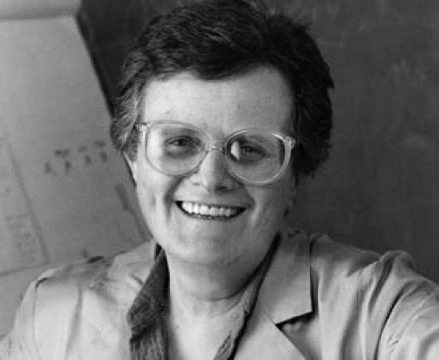Neena B. Schwartz, PhD, 1926-2018
By Emma Florio, Special Collections Library Assistant
Neena Betty Schwartz was born on December 10, 1926, in Baltimore to Russian Jewish parents. In 1944 she enrolled at Goucher College, a women’s college in Baltimore. Although initially interested in English and journalism, after taking a science class she changed her focus to physiology. She spent summers during college conducting research with biologist Curt Richter at Johns Hopkins and at the Jackson Laboratory in Bar Harbor, Maine. Schwartz earned her AB from Goucher in 1948, having received the Lilian Welsh Prize in Physiology, named after a longtime professor at the school.
 |
|
Schwartz in her lab at Northwestern, from Northwestern Alumni News, January 1980.
|
After graduation Schwartz moved to Chicago to attend Northwestern University Medical School. She earned her Master’s in physiology and in 1953 completed a PhD under the supervision of endocrinologist Allen Lein. Her dissertation was titled “The Influence of Thyroid Hormone on the Skeletal Muscle Function.” She initially lived near Michigan Avenue and Oak Street, close to the medical school’s campus and coincidentally also close to Old Town, the city’s gay neighborhood at the time. In her memoir, A Lab of My Own, Schwartz recounts going to gay bars on nearby Division Street but only really finding a lesbian community through a friend from high school who also moved to Chicago—it was during her high school years in Baltimore in the 1940s that she first recognized herself to be a lesbian.
In 1953, having turned down a postdoctoral fellowship with the United States Public Health Service, Schwartz became an instructor, and eventually Assistant Professor, of Physiology at the University of Illinois College of Medicine in Chicago. After a three-year stint as director of the Biology Laboratories in the Institute of Psychosomatic and Psychiatric Research and Training at Michael Reese Hospital (where she met her partner of 17 years, sociologist Rue Bucher), she returned to the University of Illinois as an Associate Professor of Physiology. She rose to full Professor and became Assistant Dean for Faculty in 1968. During this time, she began to do research that would define her career, namely investigating the factors that establish reproductive cycles in mammals, particularly the role of the protein inhibin in regulating ovulation.
After two more years at Illinois as Professor of Neuroendocrinology, Schwartz returned to Northwestern, where she would spend the rest of her career. She started on the faculty of the medical school as a Professor of Physiology before being invested as the Deering Professor of Biological Sciences in the Weinberg College of Arts & Sciences in 1974, a position she held for 25 years. She was instrumental in organizing Northwestern’s Program for Reproductive Research, and in 1979 she established the Minisymposium on Reproductive Biology to provide trainees with an opportunity early in their career to present their research and gain experience running a scientific meeting; it continues to this day as the Reproductive Science and Medicine Summit. In 1987 Northwestern established the Center for Reproductive Science with Schwartz as the Director. In her 25 years as Director, she trained over 50 graduate students and postdoctoral fellows.
 |
| Portrait of Schwartz from the Center for Reproductive Science |
Many knew Schwartz as a champion for women in science, spurred on by her experiences as one of the few women in the field at the start of her career. In 1971 she helped to found the Association for Women in Science, which advocated for more women in tenure track positions and on study section review panels. She also co-founded the Women in Endocrinology group within the Endocrine Society, of which she was president from 1982 to 1983. She also received many awards throughout her career, including Northwestern’s Excellence in Teaching Award, Women in Endocrinology’s Mentor Award, the American Association for the Advancement of Science’s Lifetime Mentor Award, and the Frontiers in Reproduction Pioneer Award.
In 2010 Schwartz published her memoir, A Lab of My Own, in which she publicly came out as a lesbian, partly as a way to help other LGBTQ scientists feel represented in the community. In the book, she shares the story of her life in science through the lens of her feminist and sexual identities. Schwartz likens herself to a spy with a cover identity. In her public life she felt more comfortable operating with a “Don’t ask, don’t tell” mindset, but clarifies that, in her lab, she had never hidden her private life and that her colleagues always met her partners through parties and potlucks. For the last 30 years of her life, her partner was Harriet Claire Wadeson, a pioneering art therapist who directed art therapy programs at the University of Illinois at Chicago and at Northwestern. They lived in Evanston until Wadeson’s death in 2016. Neena Schwartz died in 2018 at the age of 91. As her colleagues wrote in an obituary in Endocrine News, “Neena’s legacy lives on in the discoveries she made, the people she trained, the organizations she formed and the amazing life she led.”
Selected References
“History.” Center for Reproductive Science, Northwestern University.
Schwartz, Neena B. A Lab of My Own. Amsterdam: Rodopi. 2010.
Woodruff, Teresa K. and Kelly E. Mayo. “Remembering Neena B. Schwartz, PhD: A Lab & Life of Her Making.” Endocrine News April 2018.
Updated: October 30, 2023